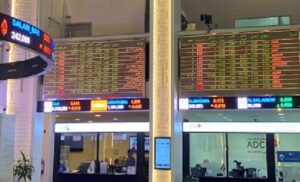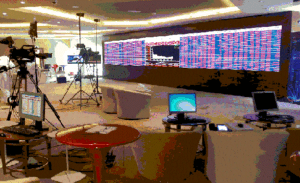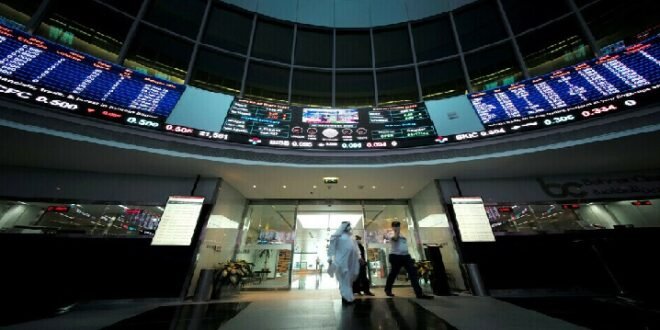17-06-2025
DUBAI: Stock markets across the Gulf fell on Sunday morning after Israel and Iran launched fresh attacks on each other overnight, sparking fears of a widening conflict in the Middle East.
Israel said it had targeted Iran’s nuclear facilities, ballistic missile factories and military commanders in strikes that started on Friday and continued over the following days, in what it warned would be a prolonged operation to prevent Tehran from building an atomic weapon.
 Iran responded by launching attacks on Israel and calling off Sunday’s nuclear talks that the United States said were the only way to halt Israel’s bombing.
Iran responded by launching attacks on Israel and calling off Sunday’s nuclear talks that the United States said were the only way to halt Israel’s bombing.
The Qatari stock market index, opens new tab slid 2.9% by around 0815 GMT, with almost all constituents in negative territory. Among them, Qatar Gas Transport Nakilat, opens new tab extended losses and was down 3.1%, while Qatar Electricity and Water Company, opens new tab was down 1.7%.
Qatar National Bank, opens new tab, the Gulf’s biggest lender; retreated 3.3%.
Israel late on Saturday attacked Iranian energy infrastructure, including an offshore installation on the South Pars gas field, which Iran shares with Qatar and is the source of most of the gas produced in Iran, stoking fears of potential disruption to the region’s energy exports.
Saudi Arabia’s benchmark index, opens new tab recovered some ground to trade 1.6% lower, after plunging 3.6% at the open as stocks fell across sectors.
In Kuwait, where the main index, opens new tab was down 4.3%, shares in Jazeera Airways, opens new tab fell as much as 10%, as airlines avoided the airspace over most of the region.
Elsewhere in the Gulf and wider Middle East, the Muscat Stock Exchange, opens new tab registered a 1.5% fall, the Bahrain index, opens new tab eased by 0.8%, while Tel Aviv stocks opened lower by 1.5%.
Oman was a mediator between Iran and the United States in the nuclear talks.
 The Dubai, opens new tab and Abu Dhabi, opens new tab bourses in the United Arab Emirates, which will reopen on Monday, closed down 1.9% and 1.3%, respectively, on Friday.
The Dubai, opens new tab and Abu Dhabi, opens new tab bourses in the United Arab Emirates, which will reopen on Monday, closed down 1.9% and 1.3%, respectively, on Friday.
Meanwhile, Tel Aviv stocks erased early losses and ended higher on Sunday in the first trading session since the start of a wave of missile strikes between Israel and Iran on Friday, as Israel and its economy attempt to remain as open as possible.
The blue-chip Tel Aviv 35 index, opens new tab closed up 0.5% while the broader TA-125, opens new tab index ended 0.4% higher, reversing earlier losses of nearly 2%. “This is proof of Israel’s economic resilience even under fire,” said Finance Minister Bezalel Smotrich.
Ronen Menachem, chief markets economist at Mizrahi Tefahot Bank, said the market initially reacted to the outbreak of war as well as significant declines on Wall Street on Friday.
“Trading today and in the coming days will likely depend on developments and assessments regarding the continuation of the conflict, its intensity and duration. The stance adopted by the United States will also be significant,” he said.
Government bond prices rose as much as 0.4%, while the shekel is not trading on Sunday. The Israeli currency weakened to 3.61 per dollar on Friday from 3.5 on June 11. Israel and Iran launched fresh attacks on each other overnight into Sunday for a second straight day.
Israel said it had targeted Iran’s nuclear facilities, ballistic missile factories and military commanders on Friday at the start of what it warned would be a prolonged operation to prevent Tehran from building an atomic weapon. Iran has promised a harsh response and has launched hundreds of missiles into Israel. (Int’l News Desk)
 Pressmediaofindia
Pressmediaofindia




